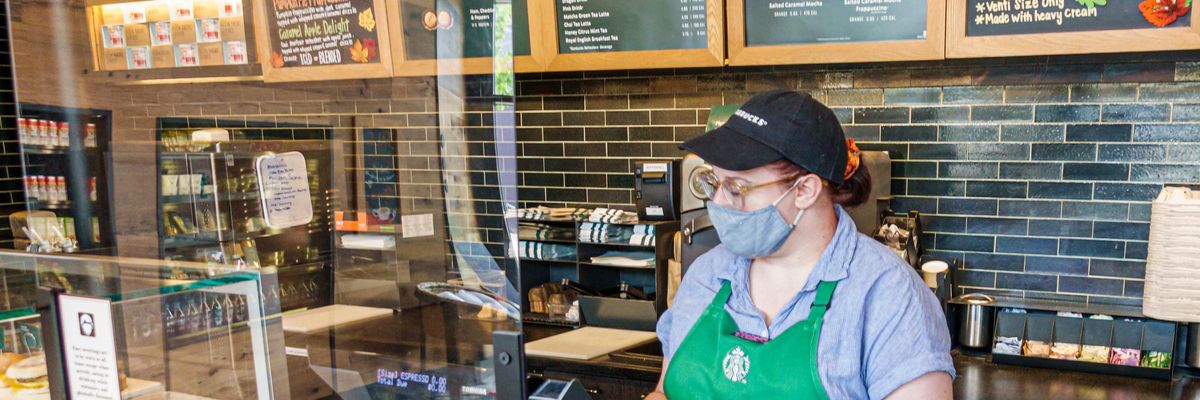

SUBSCRIBE TO OUR FREE NEWSLETTER
Daily news & progressive opinion—funded by the people, not the corporations—delivered straight to your inbox.
5
#000000
#FFFFFF
To donate by check, phone, or other method, see our More Ways to Give page.


Daily news & progressive opinion—funded by the people, not the corporations—delivered straight to your inbox.

A cashier wears a face mask at a Starbucks coffee shop location. Starbucks employees in the Buffalo, New York area began voting on November 10, 2021 regarding forming a union. (Photo: Jeffrey Greenberg/Education Images/Universal Images Group via Getty Images)
"Starbucks will do everything it can to stop Workers United's organizing drive in Buffalo."
\u201c.@Starbucks will do everything it can to stop @SBWorkersUnited\u2019s organizing drive in Buffalo, NY.\n\nCheck it out, they got a bingo on our card!\u201d— Liz Shuler (@Liz Shuler) 1636483605
Donald Trump’s attacks on democracy, justice, and a free press are escalating — putting everything we stand for at risk. We believe a better world is possible, but we can’t get there without your support. Common Dreams stands apart. We answer only to you — our readers, activists, and changemakers — not to billionaires or corporations. Our independence allows us to cover the vital stories that others won’t, spotlighting movements for peace, equality, and human rights. Right now, our work faces unprecedented challenges. Misinformation is spreading, journalists are under attack, and financial pressures are mounting. As a reader-supported, nonprofit newsroom, your support is crucial to keep this journalism alive. Whatever you can give — $10, $25, or $100 — helps us stay strong and responsive when the world needs us most. Together, we’ll continue to build the independent, courageous journalism our movement relies on. Thank you for being part of this community. |
"Starbucks will do everything it can to stop Workers United's organizing drive in Buffalo."
\u201c.@Starbucks will do everything it can to stop @SBWorkersUnited\u2019s organizing drive in Buffalo, NY.\n\nCheck it out, they got a bingo on our card!\u201d— Liz Shuler (@Liz Shuler) 1636483605
"Starbucks will do everything it can to stop Workers United's organizing drive in Buffalo."
\u201c.@Starbucks will do everything it can to stop @SBWorkersUnited\u2019s organizing drive in Buffalo, NY.\n\nCheck it out, they got a bingo on our card!\u201d— Liz Shuler (@Liz Shuler) 1636483605